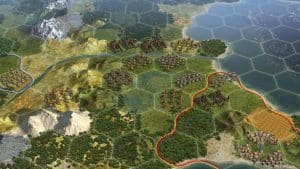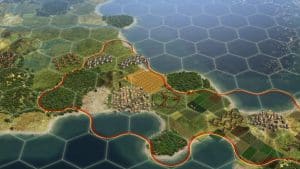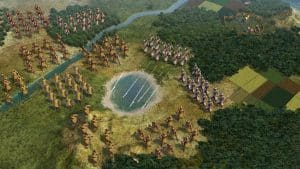Sid Meier’s Civilization V
Related Games
Description
🔥 What is Sid Meier’s Civilization V for PC
Sid Meier’s Civilization V is a turn-based strategy game developed by Firaxis Games and published by 2K Games in 2010, quickly becoming one of the most influential entries in the long-running Civilization series. As the fifth installment, it reimagined the formula with significant mechanical innovations, most notably hexagonal tiles and the elimination of unit stacking, creating a deeper and more tactical battlefield. Players step into the role of a world leader, guiding their chosen civilization from ancient times all the way to the modern age, competing or cooperating with other nations along the way.
The game’s premise is simple in theory yet endlessly complex in execution: you build cities, research technologies, expand your territory, establish diplomatic relationships, and, if necessary, wage war to dominate the world. Unlike many other strategy games, Civilization V focuses on a balance of long-term planning and moment-to-moment adaptation, where every decision whether building a wonder, signing a treaty, or moving a military unit can have consequences that echo for centuries.
Part of its enduring charm comes from how it balances history with imagination. Real-world leaders like Napoleon, Gandhi, and Cleopatra come alive with unique traits and abilities, yet the player writes their own alternate version of human history. You might see Mongols mastering spaceflight or Romans spreading democracy across continents, creating countless stories unique to each playthrough.
👉 Features of Sid Meier’s Civilization V
Hex-Based Maps
One of the most striking features of Civilization V is the introduction of hexagonal tiles instead of the traditional square grid. This change dramatically alters strategic planning, allowing more fluid movement, natural-looking terrain, and deeper tactical positioning during combat.
One-Unit-Per-Tile System
Perhaps the most controversial but ultimately groundbreaking change was the one-unit-per-tile rule, which prevented the dreaded “stack of doom” from previous titles. This forced players to think more carefully about troop placement, flanking, and terrain advantages, adding a chess-like layer of tactical depth to military campaigns.
Distinctive Civilizations and Leaders
Each civilization in Civilization V is designed with unique bonuses, units, and buildings that shape how they play. Whether it’s the seafaring strength of the English, the cultural dominance of the French, or the militaristic efficiency of the Zulu, players are encouraged to adapt strategies to suit their leader’s strengths.
Deep Diplomacy and City-States
For the first time, the game introduced city-states as independent political entities. They offer quests, resources, and influence-based rewards, while also complicating diplomacy by adding a third layer between direct rival civilizations. This system adds flavor and more negotiation opportunities, enriching the game’s political landscape.
Expansive Modding and DLC Support
Civilization V is also known for its extensive modding community and expansion packs, most notably Gods & Kings and Brave New World. These expansions add religions, espionage, trade routes, ideologies, and more, making the game far deeper and more replayable over time.
Gameplay
Strategic Layers of Decision-Making
Civilization V thrives on decision-making that feels both immediate and long-reaching. On a given turn, you may decide whether to invest in scientific research, expand military presence, or develop cultural policies. While any choice might seem small, it can ripple into future centuries, altering your empire’s path toward victory.
Paths to Victory
The game offers multiple victory conditions that encourage different playstyles. Military conquest can grant a Domination Victory, scientific investment can lead to a Science Victory through space exploration, cultural influence can achieve a Cultural Victory, and diplomacy at the United Nations can secure a Diplomatic Victory. Each route forces players to adapt strategies depending on their civilization, geography, and rival behavior.
Combat and Tactics
The reworked combat system emphasizes terrain, positioning, and combined arms. Ranged units can strike from behind front lines, cavalry excels at mobility, and naval warfare becomes crucial on water-heavy maps. The one-unit-per-tile system encourages thoughtful planning rather than brute force, rewarding those who use terrain advantages wisely.
Diplomacy and Espionage
Diplomacy evolves over the course of the game, starting from simple pacts and trades to complex alliances and ideological conflicts. With expansions, espionage adds another hidden layer, letting players steal technologies, manipulate city-states, or counter foreign spies. The interplay of trust, betrayal, and shifting alliances keeps every match unpredictable.
Religion, Culture, and Ideologies
Especially with expansions, religion plays a major role in shaping empires. Founding a religion allows players to spread faith across continents, offering both spiritual and material advantages. Meanwhile, cultural policies and late-game ideologies (like Freedom, Autocracy, or Order) not only define your empire’s identity but can also lead to ideological wars against rivals with conflicting values.
Graphics
Clean and Accessible Art Style
Civilization V adopts a clean, painterly art direction that balances clarity with visual appeal. Terrain tiles look natural and distinct, while units and buildings are easily recognizable, ensuring that the player never feels visually overwhelmed even on sprawling maps.
Animations and Leader Interactions
Leader interactions stand out as cinematic flourishes. Each leader is portrayed in a distinct environment, speaking their native language, and showcasing unique animations that reflect personality traits. This gives diplomatic encounters more flavor and immersion than ever before.
Visual Effects and Scale
Although not graphically demanding compared to modern games, Civilization V manages to convey a sense of scale beautifully. The map expands from humble beginnings into a world filled with sprawling metropolises, gleaming wonders, and bustling trade routes, creating a living tableau of civilization’s march through time.
Performance and Accessibility
Part of Civilization V’s strength lies in its optimization. Even on modest systems, it runs smoothly, making it accessible to a wide range of players. The UI is designed with clarity in mind, ensuring that information is presented efficiently without overwhelming players with data dumps.
Pros and Cons
✔️ Pros
- Hex-based maps and one-unit-per-tile combat create deeper and more tactical strategy gameplay.
- Multiple victory conditions encourage varied playstyles and replayability.
- Strong expansion packs (Gods & Kings and Brave New World) enrich the base game dramatically.
- City-states and diplomacy add fresh layers of political strategy and unpredictability.
❌ Cons
- The base game without expansions feels somewhat shallow compared to the complete edition.
- AI behavior can be inconsistent, with rivals making illogical military or diplomatic choices.
- Late-game turns can become slow and tedious, especially on large maps with many civilizations.
ℹ️ Game information
Release Date: 23/09/2010
Update Date: 07/10/2025
Version: v1.7.1
Genre: Simulation / Strategy
Platform: PC
Language: ![]()
![]()
![]()
![]()
![]()
![]()
![]()
![]()
Weight: 8 GB
Additional info: New version includes all DLCs to date
⭐ Installation Instructions
- The game is fully complete, you just need to install it, so there is no need to unpack it or download it from other sources.
- Just run the Sid Meier’s Civilization V.exe installation file.
- Simply launch the game from shortcut desktop.
⚙️ System Requirements
✅ Minimum:
- OS: Windows Vista/7
- Processor: Intel Core 2 Duo 1.8 GHz / AMD Athlon X2 64 2.0 GHz
- Memory: 2 GB RAM
- Graphics: 256 MB ATI HD2600 XT / 256 MB nVidia 7900 GS
- DirectX: Version 9.0c
- Network: Broadband Internet connection
- Storage: 8 GB available space
✅ Recommended:
- OS: Windows Vista/7
- Processor: 1.8 GHz Quad Core CPU
- Memory: 4 GB RAM
- Graphics: 512 MB ATI 4800 series / 512 MB nVidia 9800
- DirectX: Version 9.0c
- Network: Broadband Internet connection
- Storage: 8 GB available space
Images









